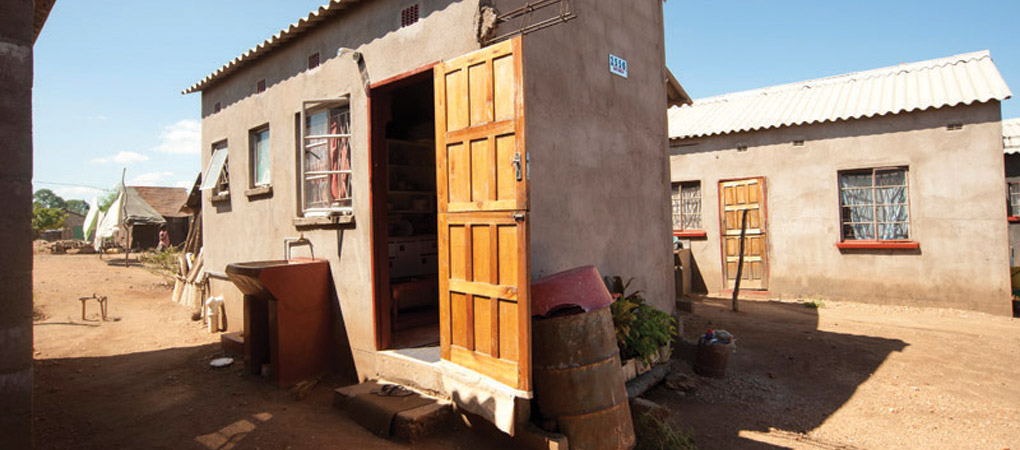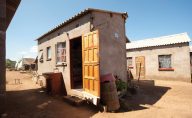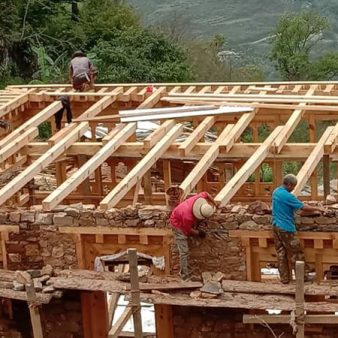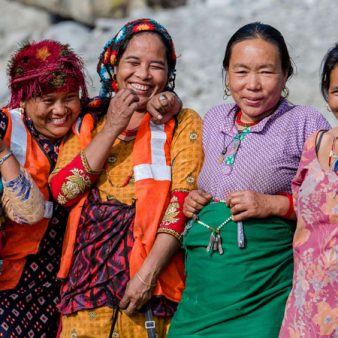CLIFF starts from the philosophy that the poor are worthy of investment. Instead of giving one-off grants, CLIFF helps establish organisations in Asia and Africa with the capacity to provide slum dwellers with access to affordable housing finance. This approach not only facilitates the construction of affordable homes and neighbourhoods, it also generates enough financial return to allow the organisations it funds to achieve financial sustainability. In Nepal, this approach has enabled CLIFF investment to act as venture capital, proving the viability of projects that then achieve investment from established banks and lenders. Currently operating in fourteen countries, CLIFF has supported more than 70 housing and infrastructure projects in Asia and Africa between 2010 and 2014.
Project Description
What are its aims and objectives?
CLIFF stands for Community-Led Infrastructure Finance Facility. It defines its core work as, ‘to support slum dwellers to improve their lives and find lasting solutions to urban poverty’. CLIFF aims to address housing and basic services of slum dwellers, which are not adequately addressed by the local government or private sector. CLIFF is a project coordinated and partly funded by UK based organisation Reall (formerly known as Homeless International). It provides affordable finance to its Implementing Partners. Reall then work with these organisations to develop financially viable housing projects for their low-income communities. The long-term ambition of CLIFF is to help the projects achieve significant scale. It does this through:
- Using the projects as demonstration projects.
- Reducing the risk of investment in housing for low-income people.
- Unlocking large-scale, private investment for future CLIFF projects.
CLIFF’s approach is to develop self-reliant housing projects that are capable of creating sustainable settlements, shelter and services. This is delivered through a long-term partnership approach with Implementing Partners, funding partners, and technical partners. Reall play a strategic management and coordination role in this process. CLIFF provides capacity grants and revolving capital funds to the Implementing Partners. The Implementing Partners use the revolving funds to offer loans and to make strategic investments, such as the purchasing of land. Through CLIFF, the Implementing Partners are also able to influence national policies and have amplified the voice of the urban poor at local, regional and national levels.
What context does it operate in?
According to UN-Habitat there are over one billion people living in slums. The vast majority of these slums are in developing countries. The housing and basic services needs of this population are not adequately addressed by local government or private sector. The institutions responsible for land planning, land markets and basic services are often weak or dysfunctional. Most of them lack both resources and capacity. Market-based projects aimed at upgrading slums tend to be short term and not sustained by responsible public institutions, while aid money is insufficient, considering the rate and scale needed to tackle the problem. The CLIFF programme is set up within this context and starts with the premise that the urban poor are worth investing in. The programme is underpinned by the logic that if a financially sustainable implementing organisation is created and maintained, then the programme will continue to grow, irrespective of changing donor climates. CLIFF has 14 partners in 15 developing countries and is involved in 70 projects across 33 cities. Where possible it also works with municipal authorities and is positioning itself to be able to receive loans/funds from both private sector and donor/development bank type organisations.
What are its key features?
What makes CLIFF different is its belief that the urban poor are worthy of investment and lending. CLIFF was established on the belief that housing and basic services designed and built in an appropriate and affordable manner can be paid for by the urban poor themselves. As a result, the programme works to counteract the current exclusion of urban poor groups from appropriate housing finance. To do this, CLIFF builds the capacity of local organisations committed to supporting the urban poor and delivers its vision with a twin approach programme:
- To build capacity of partner organisations, helping them to consolidate their strengths and address their weaknesses. Through the support of CLIFF a number of Implementing Partners have developed the capacity to influence the policies of local and national level governments and financial institutions. For example, in Nepal LUMANTI, a national NGO and long-term CLIFF Implementing Partner, has been able to secure as much as 80 per cent of their total project costs from local banking institutions.
- Alongside and connected to this capacity building, CLIFF provides Implementing Partners with recoverable capital funds to buy land, construct houses and to provide affordable micro-mortgages to slum dwellers. Early on in the CLIFF programme, capital funds were only recycled at a national level. However, as the CLIFF Implementing Partners have matured into sustainable Community Development Enterprises, a change in approach has occurred. Broadly speaking, Reall now distribute capital funds to CLIFF partners as a loan, allowing the recycled funds to be redeployed anywhere across the global portfolio. This approach encourages financial discipline amongst CLIFF’s Implementing Partners and rewards this with access to a larger, more responsive, capital fund.
Through a long-term partnership approach, CLIFF is able to support partner organisations towards a position of operational sustainability. In this way, the programme demonstrates a commitment to building institutions capable of accessing sustainable sources of finance and delivering housing projects at scale and in perpetuity.
How is it funded?
At present, CLIFF is supported by two international donors, the UK Department for International Development (DFID) and the Swedish International Development Cooperation Agency (SIDA). In 2013/14, the largest donor was DFID, its funding is committed until 2015. Discussions are already underway to ensure continued DFID support for CLIFF Phase 3. The project has good economic sustainability strengths, with a number of partners already progressing to a position where they are able to receive their capital funds as a loan. In terms of repayment rates from communities, CLIFF is targeting a 100 per cent repayment rate, with partners encouraged to maintain a Portfolio at Risk rate of between 5 and 10 per cent. During the early stages CLIFF provides grants to help build the capacity of its local Implementing Partners. Overtime, this grant funding is phased out, with organisations covering their operational costs through effective business planning. The reduction of capacity grant funding has the potential to boost the amount of funding available for capital projects. In 2013/14, CLIFF spent £7,685,753 on capital grants and loans to its partners. In the same year it had an income of £10,801,603 (including £1,377,539 carried forward from the previous year). The majority of its income is raised from donors. Reall’s revenue costs for operating CLIFF were £678,355. The excess of income over expenditure in 2013/14 was absorbed by the programme in the opening part of the 2014/15 financial year.
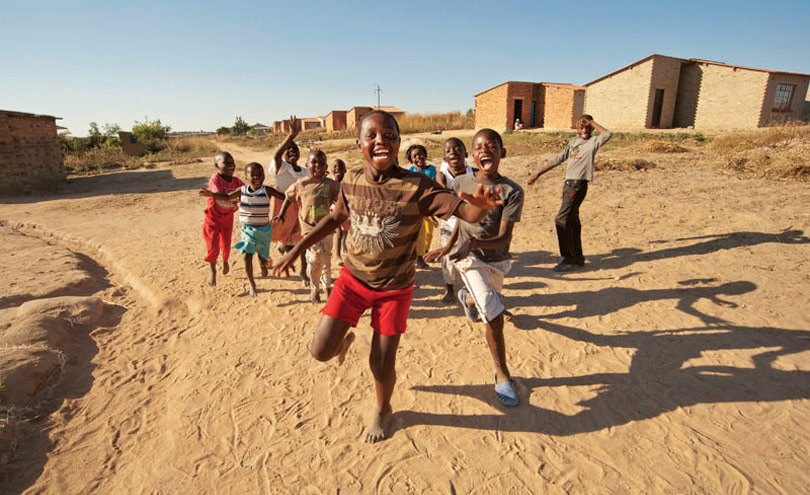
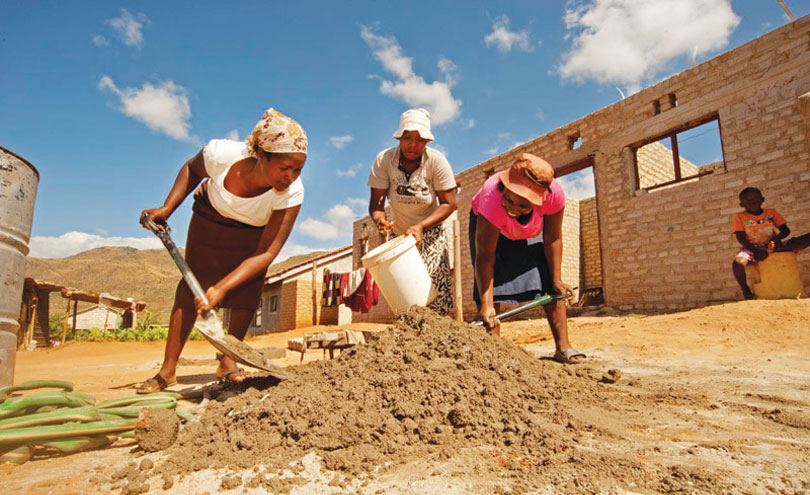
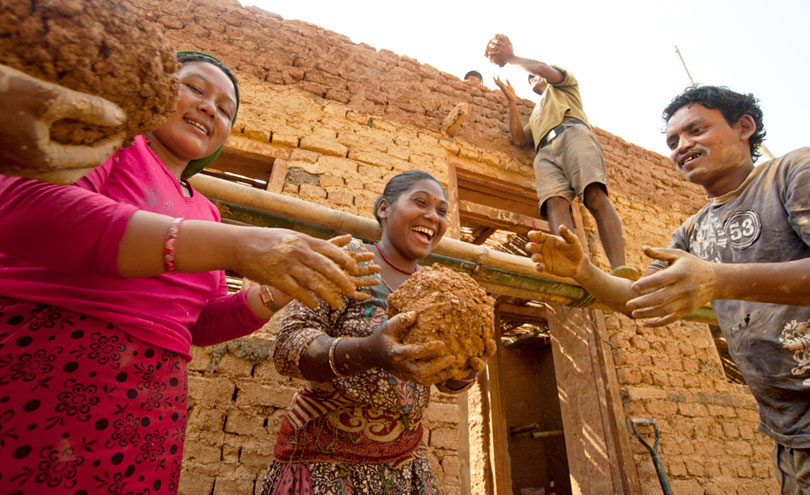
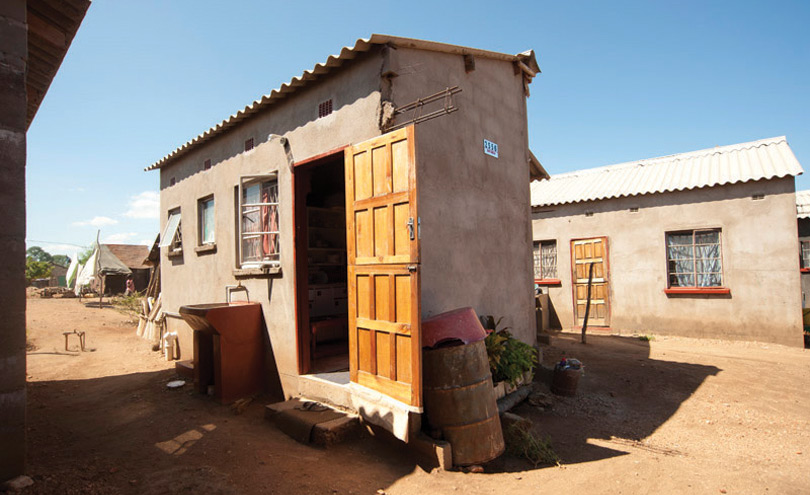
What impact has it had?
The CLIFF project has had a very significant and positive effect on the communities it has served. The housing finance system has created a significant amount of suitable affordable housing that would not have otherwise been built. Indeed there is evidence that this has had a catalysing effect leading to more homes being built. For example, CLIFF funded the construction of 180 houses by the Vashandi Housing Cooperative in Zimbabwe but this led to an additional 500 being built, with a further 500 now under construction. Moreover, the house building has had a positive effect on local economic activity. The Vashandi project has led to the direct creation of at least 200 jobs. In total, the CLIFF 2 programme has approved, commenced or completed the construction of 10,699 homes. As of April 2014, 17,183 people had already occupied their new homes, complete with improved water and sanitation, with a further 35,062 set to benefit.
Beyond housing projects, the CLIFF programme is also set to benefit a further 101,617 people through numerous sewerage disposal and sanitation projects approved in India and Nepal. CLIFF has also influenced the housing policies in many developing countries. Causing policy change is one of CLIFF’s performance indicators. It targeted changes in six countries; in fact there has been change in eight. For example, CLIFF’s Angolan Partner, DWA, was able to secure a reduction in the minimum plot-size requirement; whilst ZINAHCO, CLIFF’s implementing partner in Zimbabwe, gained formal acknowledgement of the cooperative housing model. Some projects have also been successful in changing local investment policy from lenders. In Nepal, LUMANTI have been successful in securing as much as eighty per cent of the total project cost from local banking institutions, a percentage previously unobtainable. The project has received international recognition by receiving the UN Scroll of Honour in 2014.
Why is it innovative?
With its belief that the urban poor are worthy of investment and lending, it delivers its programmes with a twin approach.
The innovation CLIFF brings to the sector is to build capacity of partner organisations, help them maintain their strengths and enabling them to work on more complex dimensions of housing programmes, such as land and financing. A number of CLIFF partners have also developed capacity to influence the investment policies of local and national banks. For example, in Nepal LUMANTI, a national NGO and CLIFF partner, was able to secure 80 per cent of the total project cost from local banking institutions. CLIFF uses donors innovatively. It uses them to build partners’ capacity through ‘capacity funds’ and provide them with additional recoverable capital funds to buy land, lend micro-mortgages to slum dwellers and to invest in physical construction. All capital funds are recoverable from the partners. Once recovered, the funds are recycled through the same or different partners.
What is the environmental impact?
CLIFF projects have the opportunity to reduce the carbon footprint of urban development by championing the cause of appropriate-tech, sustainable settlement solutions. A good example is the use of adobe mud bricks in Tansen, Nepal which have very low embodied energy values and are very locally sourced, saving on transport and energy costs.
Additionally, the design of LUMANTI’s apartment building in Lalitpur, Nepal, tackles the city’s frequent water shortages by implementing a rainwater harvesting system, allowing residents constant access to water for cleaning and cooking with low energy inputs. Similarly, the use of solar powered electricity builds resilience against the cities frequent power outages.
Is it financially sustainable?
The long-term aim is for CLIFF to become fully self-sustaining, although this aim may not be realised for many years. The establishment and growth of CLIFF has been made possible by the significant contribution of donors. At present, there is a continued donor interest in building the capacity of CLIFF. CLIFF was established with financial sustainability built in at all levels. In-country partners are helped to grow sufficiently to generate enough financial return to allow them to operate without grant based support. This has helped the organisations to begin pursuing alternative sources of investment with the aim of becoming fully self-sustaining.
What is the social impact?
The project provides support to those who would otherwise be excluded from participating in the urban development process. It promotes greater community cooperation and encourages gender equality. More than 75 per cent of the programmes beneficiaries are women or children and the model offers particular support to social cohesion initiatives through the empowerment of women-led savings groups. In some countries, CLIFF has supported projects for people with disabilities, offering hope to this uniquely disadvantaged demographic. In all cases, the programme builds the abilities of community organisations to negotiate, advocate and to better manage their operations.
Barriers
- Dysfunctional local governments are a major challenge for CLIFF. The experience of the project is that the housing sector has been neglected, not understood or financed properly in developing countries. As a result, in some cases CLIFF’s work is seen as a unique solution.
- Linked with the above, CLIFF partners are expected to address a number of sector-related issues, including the complexity of land tenure and sustainable supplies of materials.
- In a number of countries where CLIFF works, there is a certain perception about the role of international NGOs. They are either seen as advocacy organisations or those which deliver free goods. The role of CLIFF in supporting financial and technical capacity has been difficult to communicate.
- CLIFF believes that the urban poor are worthy of investment. However, large financing institutions are under pressure to offer ‘safe lending’ and do not see the opportunity immediately. The challenge for CLIFF is to demonstrate this bankability in order to attract large private finance.
Lessons Learned
- It is important to deliver such programmes at scale in order to deliver a meaningful impact on the knowledge and practice in the sector. This means changing a number of practices, including community engagement and financing models.
- CLIFF sees the future of partners as new urban institutions which bridge the gap between markets and governments. Therefore business modelling and long term financial sustainability is extremely important for CLIFF partners.
- CLIFF still believes that the urban poor are worthy of investment and that the finance and opportunity to deliver this at scale is available. However, it is important to recognise that housing is not only about finance, the method of delivery is equally important.
Evaluation
CLIFF sets its own performance targets and monitors them continuously. Monitoring reports are produced every three months, with major external evaluations dictated by donor funding cycles. Indicators on finance and growth show the project is on target or exceeding its targets. Indicators on the provision of basic services are, however, below target. The findings of the reports/evaluations appear to be used to make improvements to the programme.
Transfer
Significant scaling up has taken place within the project. When it started in 2002 CLIFF operated with one in-country partner (in India) it has since expanded to ten countries. The number of homes built as a result of the project has grown each year. There are good reasons to believe that expansion will continue. The in-country partners are also expanding their capacity. There is no evidence of transfer outside the project, but perhaps in a large devolved model there is no need for this to happen.
There is good evidence that local individual projects have expanded and are delivering more homes. Three in-country partners (LUMANTI in Nepal, NACHU in Kenya, and ZINAHCO in Zimbabwe) have grown to become the largest delivery agent of formal pro-poor housing in their countries. Many individual projects have been successful in documenting and disseminating learning and good practice.
There is also good evidence that national transfer is occurring. The number of in-country partners has increased significantly. Many partners are actively engaged in transferring good practice within their country and sometimes beyond. For example, LUMANTI in Nepal has established a research centre and has helped establish new research centres in new CLIFF project areas across the country.
Internationally, significant transfer has occurred. The project has expanded into ten countries. There is good evidence that cooperation and support is occurring between the in-country partners. A highly successful new partner WAT- HST from Tanzania received significant help from partners in Kenya, Malawi and Zimbabwe, enabling it to scale up its activity significantly.

